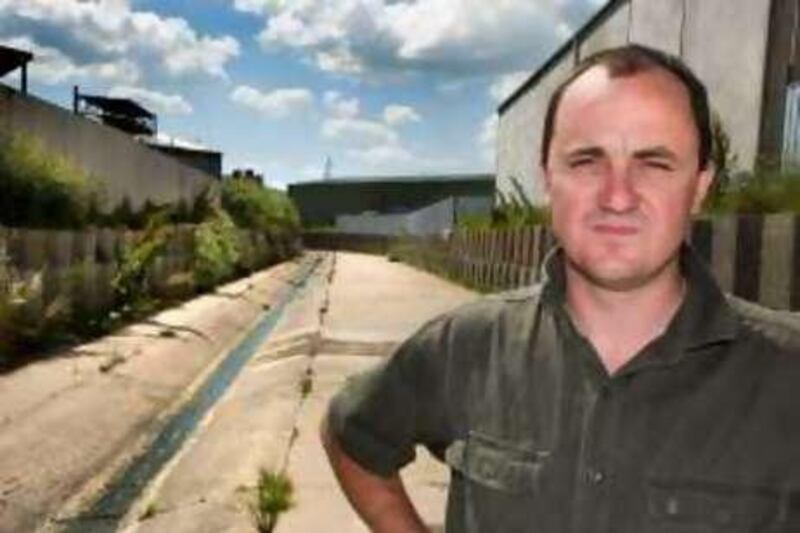sydney // Hit by years of below-average rainfall, the city of Orange is to become the first community in Australia to harvest stormwater to replenish drinking supplies and relieve the pressure of one of the country's longest droughts. The main reservoir that provides water to more than 30,000 residents has been at less than 30 per cent of capacity - which is a little more than a year's supply for the town.
Orange sits on the Central Tablelands of New South Wales about 250km west of Sydney and officials say bold measures are needed to keep the city's taps flowing. "I believe that we'd be ruined if we don't do something," said Jeremy Buckingham, a councillor in Orange and a member of the Australian Greens party. "It is a critical situation. Our traditional drinking water supplies are just not going to sustain us in the future."
Mr Buckingham is one of the architects of the stormwater plan, which is scheduled to start early next year. "It's incredibly difficult because this project is one of the first in Australia which aims to harvest water from an urban environment for drinking water," the councillor said. "There are some major issues there in terms of contaminants, including all the waste and litter that you see on the street, cigarettes butts, etc, that end up in that water supply plus other pollutants that are even more serious; heavy metals, biological contaminants and dog faeces."
There is an acknowledgement that it may take consumers a while to get used to the idea of drinking this type of purified wastewater. "People realise it may be a bit icky to begin with," Mr Buckingham said. Central to the scheme to capture rainwater that runs into the city's drains and gutters is the construction of a new weir that will store the valuable runoff before it is siphoned into a so-called "polishing pond", where filters will sift out pollutants.
The decontaminated stormwater will then be pumped into a large reservoir and mixed with traditional supplies, where it will undergo the rigours of the standard purification process. Reg Kidd, the mayor of Orange, said there would be no risks to people's health. "There will be all sorts of filtration where the rubbish will be taken out," he said. "There's no way the water's allowed to go into the main storage dam until it's reached Australian standards.
"This is an exciting way of using water more efficiently. You still want a city that's sustainable with sustainable growth that can provide employment but you can't have that without water. Most residents think it's a brilliant idea." Online opinion polls appear to support the mayor's claims. Luke Elliot, who works at a lawn bowling club in Orange, thinks the stormwater idea could be just what his thirsty city needs during such parched times. "Provided it was cleaned properly, then I don't have a problem with it," he said.
"It's been very dry here. We're currently on level five water restrictions. That's no watering of gardens, lawns or washing cars or anything like that. For us being a bowling club, it almost means we can't water our bowling greens." However, the harnessing of storm flows in Orange does have its critics. Farmers worry that any scheme to divert rainfall that courses into the city's drains into storage lakes will take water away from local creeks, which many rely upon to irrigate their land.
Ian Pearce, who grows apples and cherries near Orange, can see major problems ahead. "For our business, it won't be terribly pretty if we can't access our water," he said. "Our main concerns are that the stormwater harvesting would be an additional extraction of about 2200 mega-litres a year out of our creek system," Mr Pearce said. "We don't want Orange to run out of water but we do want to see a fair water sharing agreement reached. We don't want to be forgotten."
The champions of Orange's storm water initiative concede that some farmers may well feel the pain of reduced supplies as rainfall that would normally flow into creeks is instead collected for domestic and commercial consumption. "We are very mindful that there are users downstream and we are impacting on what is already a very stressed catchment but we have no choice," Mr Buckingham said. "The yields into our dams in the last five years have been as low as 10 per cent of the long-term average."
As Australia's worst drought in a century continues to bite, the city of Orange is determined to press ahead with its stormwater system as it seeks to protect itself from nature's extremes. "We hope to have it operating in March," Mr Buckingham said. "We still do need rain but we traditionally do get some good rains in that March, April, May period. "Ultimately I hope that it could deliver as much as 30 per cent of the city's water supply." pmercer@thenational.ae





